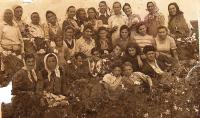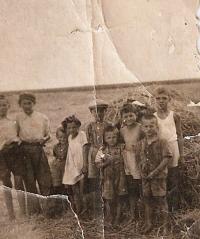Elena Bobocel (n. Butoi)
* 1928
-
Elena Bobocel: Yes, at the corner of the village. At the corner of the commune, as it was back then. Costică already knew, he had all papers ready on the dashboard, everything, he didn't know it would happen then, but he knew the reason... He got out of the car as well, holding the keys in his hand, and the officer told him: „Comrade Bobocel, as of today, you are no longer allowed to...” No! „What are you willing to give up?” Your car? Or your family?” He replied: „I can't give up my family; I would give away my car in a second. Whatever happens, I will not give up my family! Take the keys!”
R: So, he was given a choice... Yes, I don't think they would have deported him, had he given up on his family!
Elena Bobocel: No, no. He would have stayed.
R: I see.
Elena Bobocel: So then, he gave him the keys, the officer took them. Costică got into the car, handed him the papers, got in the other car and the officer brought him home. He brought him home. When I saw Costică, I couldn't stop crying. What can I say! I couldn't handle it! He told me I wasn't allowed to take anything from the house, other than the child and what was strictly necessary for the child, as well as „A change of clothes for you, you needn't take anything else!”. „And then, what he might have said, what he talked about with Ilă that it wasn't really like that, or I don't know, what Ilă might have told them, that he had come to tell me: „That I can take ...” No! I wasn't told anything! When the car arrived, he ordered the soldiers to go inside, take a bed out of the house, with everything on it, pillow, sheet, whatever, mattress, and ... to take a table, four chairs, and more ... „Take some more, a duvet. You can also take one or two bed sheets. A blanket, I see you have many good blankets. And thick blankets, I don't know. Maybe you will need them for the girl, for the child”. Soldiers carried me out, where they also put my things.
-
We were told to get out off the train, there. There were stakes in the ground, four stakes, just there. Father said: „What are we gonna do here? Look, there's a cloud! But a very small cloud!” Before he could say „What are we gonna do here?”, it was already raining. Costică and Ion, together with Culaie, immediately took the blankets and made a shelter from them, putting blankets on top to cover the children and father. It passed quickly, this one! It went fast! Then, the next day, in the evening, Costică talking to Ms. Maria: „So, old man, what are we going to do tomorrow?” «What can we do? We wait. We just wait and see, die otherwise! What these guys are doing to us right now! »
R: So, everyone was left there in the field with their luggage?
Elena Bobocel: Yes, Yes. In the field, of course, in the field.
R: Did you have any food?
Elena Bobocel: Food? What you had taken with you! Had you taken nothing, you had to bear with it! We arrived there in the evening. Where were we supposed to get food from? Did we have cooperatives? Were there stores? Was there a store with potatoes, cucumbers, cabbage or anything of the kind? What did we have?
-
I went to the city hall. Gâtan was mayor back then. And he said: „No, Sir! Whoever let you go should give you your homes back!” „Well, yes, they gave me the house. It's my house now. You just have to leave the house!” „No! I have no orders to leave the house! Go to Ghergulescu! „I wasn’t taken away from Ghergulescu’s house!” Ghergulescu, being his brother-in-law! „Nobody took me away from Ghergulescu. I was taken away from my one home, I was taken away!” Then I said: „All right. Look, I'm gonna show up at the militia station, and then come to put my things in the hallway!” Because the hallway was free. There were rooms on the right, the cooperative was straight ahead, and there were more rooms on the left. Everybody was passing through. „No, no! Don't you bring anything in the house! Not in the house, nothing there! „I'll put my things in the cellar!” „The cooperative has its warehouse in the cellar.” „I don't care. It's my cellar. I'll break down the door and still get my things in the cellar.” I left. I went to the militia. It was in Gârdoaia, at Mr. Petrache, the militia.
-
Celé nahrávky
-
comuna Floreşti, judeţul Mehedinţi, 14.02.2009
(audio)
délka: 02:25:50
Celé nahrávky jsou k dispozici pouze pro přihlášené uživatele.
And we had hundreds of chickens, geese, ducks, turkeys, 18 pigs... Except for three or four chicken, we didn’t take anything with us in Bărăgan.
Elena Bobocel was born on August 6, 1928 in Florești, Mehedinți County.
She married Costică Bobocel, who worked as a driver and secretary of an enterprise, and was a member of the Communist Party. They had two children together: Monica, born in Florești, and Nelu, born in deportation.
In the night of June 17-18, 1951, the head of the local militia station came to inform them they would be evicted from their home. At that time, only Elena Bobocel, her father and daughter were at home; her husband was on duty as a driver in Baia de Aramă. Costică Bobocel was stopped on his way back, and had to choose between freedom (thanks to his party membership) and deportation together with his family. Without any hesitation, the man chose to stay with his family.
With only few personal items and supplies, the Bobocel family was put on a truck and taken to the train station. The deportation order was then issued to the parents of Elena Bobocel, Ion and Ana Butoi.
They were left in the Bărăgan Plain in Rubla, on a plot of land with no buildings, where cotton was cultivated. From the first moment on, they began making a shelter to protect themselves from rain.
While Elena Bobocel had a restriction order, having been allowed to move only within a radius of 15 kilometers and having had to work at the village farm, her husband benefited from his older statute, having received good references to work as a truck driver, and could thus move around the country without supervision.
A year after arriving in Bărăgan, pregnant with the second child, Elena Bobocel lost her father, while her husband died a few weeks later. Costică Bobocel was only 29 years old.
Elena Bobocel was left there with two little children and an elderly mother to care for until the end of 1955, when they were given permission to return home.
Back home, Elena Bobocel realized that her home and the family‘s courtyard were occupied by the authorities and converted into an agricultural cooperative (Romanian: CAP). With the help of her brother-in-law, she managed to get a room and the kitchen back, and then eventually the whole house.
Even after returning home, Elena Bobocel‘s life was not free of problems and worries. The deportation file hunted her for a long time, in that she could hardly get a job, and was thus often forced to depend on the support of the neighbors and her brother-in-law.
She finally managed to get a job as a cleaning lady at the village clinic, and then worked in the mine where her son was an engineer, until she retired.

